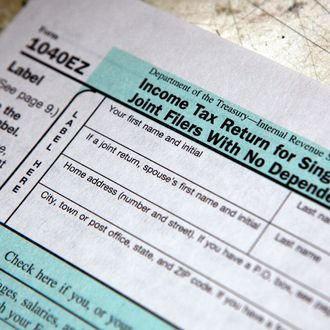
At some point in the next few weeks, if you’re anything like me, you’ll sit down with a huge mess of papers and do your taxes. It’s a perpetually unpleasant task, even if you’re relatively adept with numbers. But did you know that it might be much, much less annoying, if it weren’t for a group of tax-preparation-industry lobbyists fighting to keep the status quo?
ProPublica has a great and maddening article about how Intuit, the company that makes TurboTax, has spent nearly $12 million over the last five years lobbying against proposals to allow people with simple tax returns to have them filed automatically — a policy change that would hurt their business, but be immensely helpful to ordinary Americans and save millions of dollars a year in spending on audits and investigations.
Intuit’s argument, basically, is that the IRS can’t be trusted to do people’s taxes for them:
Intuit argues that allowing the IRS to act as a tax preparer could result in taxpayers paying more money. It is also a member of the Computer & Communications Industry Association (CCIA), which sponsors a “STOP IRS TAKEOVER” campaign and a websitecalling return-free filing a “massive expansion of the U.S. government through a big government program.”
In an emailed statement, Intuit spokeswoman Julie Miller said, “Like many other companies, Intuit actively participates in the political process.” Return-free programs curtail citizen participation in the tax process, she said, and also have “implications for accuracy and fairness in taxation.”
But that argument falls flat, because the IRS already effectively does many Americans’ taxes for them. According to most studies, roughly 40 percent of all taxpayers do not itemize on their tax returns and take only the standard deductions they’re allowed. That means that their returns consist only of their W-2 wage statements, plus any interest and supplemental income they’ve earned — all information that is already given to the IRS by employers and banks. Or, to make a car analogy:
“When you make an appointment for a car to get serviced, the service history is all there. Since the IRS already has all that info anyway, it’s not a big challenge to put it in a format where we could see it,” said Paul Caron, a tax professor at University of Cincinnati College of Law. “For a big slice of the population, that’s 100 percent of what’s on their tax return.”
Austan Goolsbee outlined the case for return-free filing in this 2006 Brookings paper [PDF]. It’s an exceedingly simple idea — every year, the IRS tallies your income for the previous year, does the math, and sends you a fully completed tax return, which you can either accept or contest as being incorrect. Nothing would change for people with more complicated taxes; they’d still file their taxes (or have their accountants file them) like normal. But for people with simple taxes, return-free filing would save untold headaches, not to mention the money that is currently spent tracking down people who forget to fill out their returns or fill them out incorrectly.
But it would cut into Intuit’s business model, and the business models of tax preparers like H&R Block (which has also lobbied against return-free filing), and so it probably won’t happen anytime soon. Think about that while you’re hunched over TurboTax on the night of April 14, trying to figure out where that last 1099-MISC form went.





























